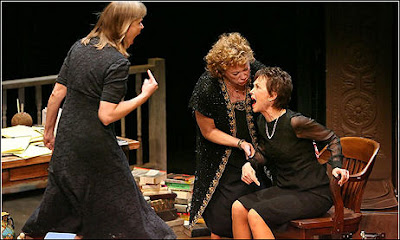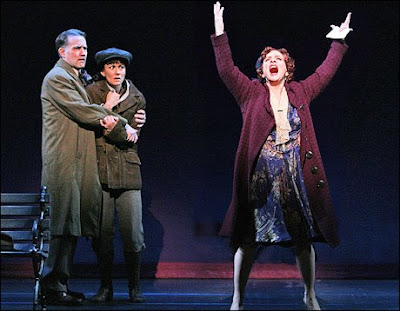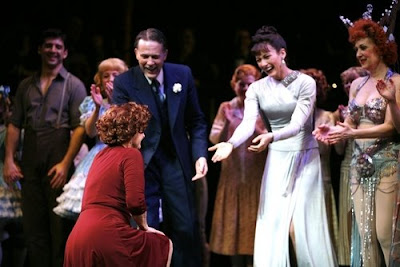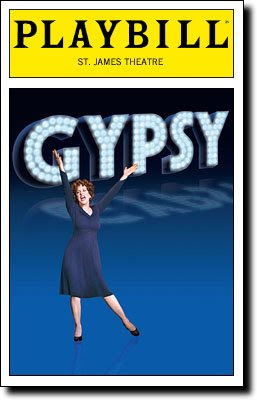Everything’s Coming Up Patti
"The Ecdysiast Play"
Oh you know the one I mean. Where crazed patrons choke one another. Where vents fall from the ceiling and light bulbs explode. Oh, and curtains come down on Laura Benanti. Yes. It’s the latest revival of Gypsy. It’s a little strange for me since it’s the first time I’ve seen a second production of a show on Broadway (especially in so short a lapse between). Bernadette Peters. Remember her? Well, anyway, Gypsy is welcome back on the Rialto anytime, as far as I’m concerned. And tonight was one of those electric nights where everything aligned for that certain 5’2″ bundle of dynamite, Ms. Patti LuPone in what early ads were referring to “the role she was born to play.” They were not wrong.
Patti came.
Patti saw.
Patti conquered.
Taking the early mold of her previous experiences with the musical, both at the Ravinia Festival in ’06 (the start of the journey that culminates in her opening last night) and the City Center presentation last summer, LuPone has refined her character with the precision of a diamond cutter. Rose is a determined mother of two very lovely young girls that she thrusts into the throes of show business in an effort to assuage her own unfulfilled ambitions. It just screams musical comedy, no? Well, anyway. It’s genius. The score. The orchestrations (and that overture. yowza!) The book. It’s almost fool-proof (so why did you tamper with it, Mr. Laurents?) You follow through Rose, the character as she goes from unmitigated determination (“Some People”) through desperation when she uses Louise in an effort to mask her emotional scarring and fear of failure (“Everything’s Coming Up Roses”) through her eventual breakdown when confronted with the reality that both show business and daughters have passed her by (her defeat: “Rose’s Turn”). Might I add, Patti’s diction was almost too perfect (not a problem, just an observation) and her vocals were the best I’ve ever heard live. Just for the record.
From Mr. Brantley, who was decidedly mixed this summer:
“When Ms. LuPone delivers “Rose’s Turn,” she’s building a bridge for an audience to walk right into one woman’s nervous breakdown. There is no separation at all between song and character, which is what happens in those uncommon moments when musicals reach upward to achieve their ideal reasons to be. This Gypsy spends much of its time in such intoxicating air.”
Nuance, chemistry and impressively layered acting abounds. From Patti. From Laura. From Boyd. From Leigh Ann. From Nemora. From Alison. From Tony. All of whom are superlative in their roles. (For my money, Laura, Boyd and Tony are definitive in theirs). As for the ending, I’m not really sure what I think. I guess if you tamper with what has been for years, you’re bound to notice. But on the flip side, the staging of the new ending is a bit more naturalistic and honed into the unresolved rift between mother and daughters. It’s not really going to make or break the experience. That happened five minutes before.
Did I mention, it was opening night? Yep. Noah and I sat in the balcony behind a deluded crone and her rude mother. One insisted on leaning forward the entire show and the other chimed in with an extensive crinkling of a candy wrapper, for literally the entire show; except when she leaned forward. That group clearly had no idea what was going on and looked out of water when the crowd continually went to pieces, especially the overwhelming standing ovation received at the end of the “Turn.” Thankfully it didn’t detract too much from the overall experience. Kari and Sarah were also among the first nighters reveling in what was a thrilling experience. Post show, we had dinner at Angus McIndoe’s. As Kari and I sat waiting like wallflowers for Noah and Sarah while they kibbitzed, I spotted none other than Mr. Stephen Sondheim at the bar. Kari and I immediately made our way over; not to speak with him make no mistake, but to sit near at the bar like the total theatre geeks we became in about, oh I don’t know, 3 seconds. (Kari surreptitiously snapped a photo with her iphone – and no one was the wiser. And she was literally trembling from her proximity to musical theatre’s living deity). Dinner was fantastic. The booze was fantastic – and I drank almost half a bottle of water – not a Poland Spring or Fiji, no I guzzled one the size of a large merlot bottle – as we made our way out. Pity it wasn’t vodka or gin. I might have had another act to my evening.
Those sighted: Angela Lansbury, Mandy Patinkin, Laura Linney (flawless with little to no makeup), Martha Plimpton, Corky from Life Goes On, Thomas Meehan, John Weidman. Others I probably had no clue were in the house. They even had a red carpet and an official opening night sticker on the playbill.
Oh, and after her curtain call, Patti LuPone lay fully prostrate onstage to her cast. It was that kind of event. Stephen Sondheim and Arthur Laurents got their props. And Sondheim gave a shout out to the late Jule Styne. (Class act). Though it appears Laurents gave Patti notes as they exited the stage…
Hey guys. Gypsy is back on Broadway. What the hell are you doing reading my blog? GET TICKETS AND GO NOW!!!!
David Lean Centennial
Today is David Lean‘s 100th birthday. One of the most legendary directors in cinema, the two-time Oscar winner (who is also the namesake of the BAFTA’s Best Director award) was known for his epics, but also crossed genres with considerable ease. His early career got off to an impressive start with several collaborations with Noel Coward on adaptations of Coward’s works. He followed this with definitive screen adaptations of two of Dicken‘s most famous works (Oliver Twist and Great Expectations). I’ve not yet seen all of his films, but allow me to recall those I have…
Blithe Spirit (1945) – Highly amusing Technicolor feature starring Rex Harrison as Charles. Constance Cummings is Ruth. Original cast member Kay Hammond recreates her Elvira. Most notable is Margaret Rutherford, also from the original company, preserving her role as the scene-stealing eccentric medium Madame Arcati. (For the record, I might add that the ever-delightful Mildred Natwick originated Arcati in the first Broadway run).
Brief Encounter (1945) – Has a fleck of ash flying into a person’s eye ever been more romantic or devastating? Adapted from Coward’s one-act Still Life, the film was an overwhelming success, winning the Palme d’Or at Cannes as well as gathering a Best Actress Oscar nomination for Celia Johnson. The film is rather iconic: it’s use of the railway station, Rachmaninoff’s Piano Concerto No. 2 for the musical score, Celia Johnson’s voice-over narration, character actor Trevor Howard as a romantic lead, the memorable climax and of course the overwhelmingly British sensibility throughout. It’s remarkable to watch today.
Summertime (1955) Lean again tackles a stage adaptation. this time Arthur Laurents’ The Time of the Cuckoo, a stage success for Shirley Booth as a spinster who carries on with a married man in Venice. Katharine Hepburn is the star. Or is it Venice? Both are remarkable to watch. The color cinematography is extraordinary and in spite of the ways the screenplay was softened, the film is still masterful and dare I say it, preferential to the original play or subsequent musical adaptation. Filmed in 1955, I’m surprised that Lean opted to use the standard Academy ratio of 1.37:1 instead of going for the widescreen expansiveness of CinemaScope or VistaVision. For such a romantic film, it starts to point towards his creative peak.
The Bridge on the River Kwai (1957) Fascinating (and fictionalized) account of British POWs who are forced to build a bridge for Japanese forces in Southeast Asia during WW2. Frequent Lean collaborator and antagonist Alec Guinness won his Academy Award as the obsessive Colonel whose behavior borders on collaboration with the enemy. William Holden stars as the sardonic escapee who reluctantly returns on a mission to the destroy the bridge. Won 7 Oscars total, including Best Picture and Director.
Lawrence of Arabia (1962) His most famous film. Hands down. If Lean had never made another film, he would still be held in renown for this desert epic. Peter O’Toole is T.E. Lawrence in this lengthy epic of the rise and fall of a megalomaniac and bizarre military genius. Two years were spent making this film and the results are extraordinary. It needs to be seen on a big screen for the first sand shot to be appreciated. It’s so stunning you think it can’t be real. A dynamic achievement that also won Best Picture and Director. Also Lean’s first collaboration with composer Maurice Jarre (who also won for that extraordinary score).
Doctor Zhivago (1965) The first Lean film I ever saw. My brother was in high school and had to watch it for his Russian class. I was entranced. The poet/doctor (Omar Sharif) whose romance for his wife and for his muse, Lara (in the role that made Julie Christie an icon) is set against the tumultuous backdrop of the Russian Revolution. Based on the Nobel prize winning novel by Boris Pasternak (which to date is the only “Russian novel” I’ve successfully read), the film is a visual delight. Also, the most famous score of any David Lean film with the balalaika-based “Lara’s Theme” later adapted into the popular song “Somewhere, My Love.” Another Oscar for Jarre. Lean didn’t hit the trifector: The Sound of Music bested Zhivago for Best Picture and Director.
A Passage to India (1984) Lean’s final film. An adaptation of E.M. Forster‘s novel about racial tensions in Colonial India. Judy Davis stars as Miss Quested, a repressed British tourist who falsely accuses a successful Indian doctor of rape (and the resulting chaos and inevitable trial). The film is superb, but most notably for the brilliant Oscar-winning turn by Dame Peggy Ashcroft as Mrs. Moore, the open-minded and kindly chaperone, whose performance alone makes the film required viewing.
"Well, I’m Not"
Only a star with the luster of Chita Rivera could shine through the abortion that was the four performance flop Bring Back Birdie, a woefully misguided sequel to Bye Bye Birdie, checking in the familiar characters twenty years down the line. (Donald O’Connor, in his Main Stem bow, succeeded Dick Van Dyke, Maria Karnilova played Mae taking over for the late Kay Medford). The spark-plug the production needed, Rivera received a Tony nomination for her efforts, which were welcomed relief for otherwise severely disappointed theatregoers. “Well, I’m Not” was her big solo effort in the second act, a follow-up of sorts to the “Shriner’s Ballet”/”Spanish Rose” numbers where Rosie defiantly sings and dances up a storm because she’s mad at Albert.
Peter Filichia recalls the first act audience reaction at the very first preview in this 2002 article.
Another Openin’, Another Show…cont’d
I Dream of…Lalume?
Yes, ladies and gents, Jeannie is singing and dancing (and take note: showing her navel). Barbara Eden was one of the four stars to take part in the 1967 TV production of Kismet, that glorious ’50s operetta by Wright & Forrest using the themes of Alexandre Borodin. Jose Ferrer starred as Hajj, Anna Maria Alberghetti was Marsinah and the telecast featured an utterly atrocious performance from George Chakiris as the Caliph. (So hard to believe this man won an Oscar).
Anyway, as Lalume, Barbara vamps it up as a sex-pot love interest for Hajj. Bored with her disinterested husband, the villainous Wazir (Hans Conried), she gets to tear things up with that great showstopper, “Not Since Nineveh” in the role created on Broadway by Joan Diener and immortalized on film by Dolores Gray. Much to my surprise, she’s actually quite good (if you can forgive the general cheesiness in the orchestrations and staging). Eden later toured in productions of Woman of the Year and Gentlemen Prefer Blondes. (Both of which she apparently taped for TV. Anyone seen those?) Enjoy this little treasure trove.
The Lady and Her Music
“I love it! I love it! I love this business. I wouldn’t do – look, I can’t I don’t, know how to do nothin’ else, but if I did, I wouldn’t change this for anything in the world. Whoo. I mean, you don’t know. You-you don’t know, but there is something that goes on between us, I must tell you. When you get home into the quiet of your wherever, think about what you are doing for me. You’re sending in – it’s a- it’s, it’s tangible, I can feel it. I can hear it, even when you’re quiet. It may just be pockets around here that don’t even like it, but what you sendin’ in is so positive that I’m workin’ with it, you know! I’m using it! Really, it’s fantastic. I not – I not only am – exist on you and really, when I’m out here, I don’t give a damn about anything that’s going on outside…”
Lena Horne, The Lady and Her Music
One of the finest solo Broadway efforts in history. Be sure to give it a try.
Quote of the Day
“I actually think, after doing Cat on a Hot Tin Roof and then Virginia Woolf, that part of my mission in life is to correct Elizabeth Taylor’s performances.”
Kathleen Turner, NY Magazine



